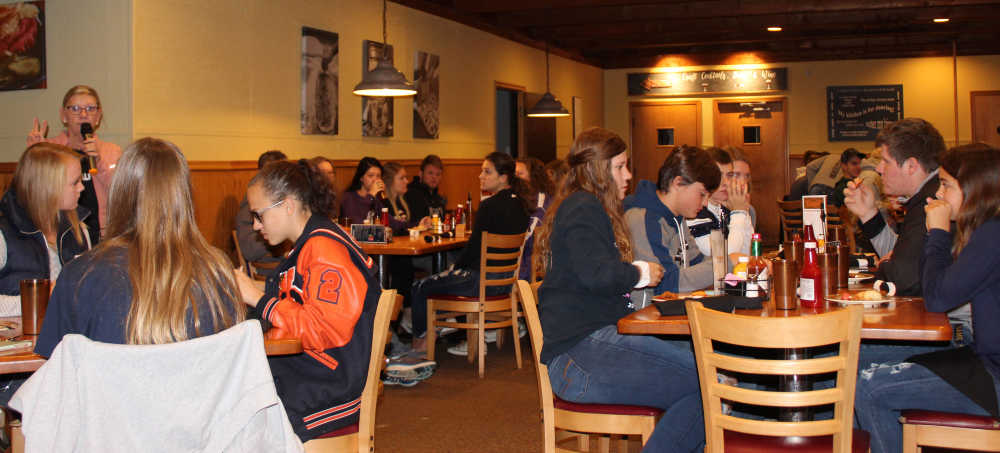P.I.E. students talk vaping

For a group of students coming from the four high schools in Putnam County, last Friday morning was an early day which began at 7 a.m.
However, they had a free breakfast to look forward to at the Putnam Inn as they met for this month’s P.I.E. Breakfast. They also had the opportunity to educate their peers on the dangers of vaping.
As such, students from each school were given some homework where they had to research different questions about vaping as a social phenomenon, as well as its legal and medical ramifications.
The meeting was moderated by Linda Merkel, who is the executive director of the Putnam County Youth Development Commission (PCYDC). Officials from the schools were also present, as well as Greencastle Police Chief Tom Sutherlin.
Students from South Putnam described the difference between a vapor and an aerosol, where the latter is made of fine particles suspended in a gaseous form as opposed to a mist. They also briefly touched on how Indiana lawmakers are considering a ban on flavored e-cigarettes because of how different tastes entice users.
Students from North Putnam shared that those who smoke e-cigarettes are two times more likely to take up tobacco cigarettes per each increase in the strength of nicotine. They also considered the case of Cooper Stevens, who became deathly ill after smoking e-cigarettes and developing an addiction.
Merkel added that the Bedford teen’s ordeal emphasizes the need to be aware of and support those who may turn to vaping as a coping mechanism or as a result of peer pressure.
Students representing Cloverdale found that vaping can affect bystanders in the same way as second-hand smoke from cigarettes. They also talked about the incurred financial costs of vaping devices such as a Juul. Merkel added how difficult it can be to identify these devices, which can look as unassuming as a flash drive.
Students from Greencastle admonished how the batteries inside vaping devices can explode and cause serious injury. They also defined “vaper’s tongue,” where a user can lose the ability to taste vap juice. Merkel also prompted how students who vap or harbor devices on school grounds can be double-penalized by administration and law enforcement.
According to a policy amended at South Putnam at the end of last year, police may issue a $295 ticket for a vaping offence as part of a county-wide initiative. This ticket can either be paid in full or deferred if the student pays $50 instead and completes a six-hour tobacco cessation program.
However, Merkel said that many vaping cases have recently come through the PCYDC’s Teen Court program, where students admit to an offence but are handed down enforceable consequences through a jury of their peers.
Before the meeting concluded, Merkel asked the students how they can address vaping in their schools. One suggested that peer pressure could be used conversely to strengthen one’s decision to stop. Another added that those present could lead by example approach those who use e-cigarettes.
However, the overall point of action was still to help others understand the dangers of vaping and their consequences -- beyond just getting in trouble at school.
The P.I.E. Coalition, whose acronym stands for Prevention, Intervention and Education, is an extension of the PCYDC which is committed to engaging local youth on substance abuse.
